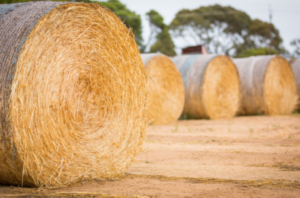A synthetic fiber baler twine that is both tough and soft is the ideal choice for hay baling. It is easy on your hands and machinery, allowing you to get the most out of your baling equipment. This twine is also treated to resist rot and mildew and can withstand rodents. It is available in a range of colours.
Unlike sisal twine, which is made of individual strands of plant materials twisted together and is naturally biodegradable, polybaler twine is made from synthetic fibres. The raw materials are melted and extruded through a flathead to form sheets of polypropylene (PP). They can then be dyed any colour needed, depending on your operation.
 The resulting twine has the tensile strength you need to tie your bales and will hold tight knots. The high UV inhibitors help to reduce fading, making it an excellent choice for outdoor use. It also has a high resistance to slippage, allowing you to make higher-density bales and save on freight costs.
The resulting twine has the tensile strength you need to tie your bales and will hold tight knots. The high UV inhibitors help to reduce fading, making it an excellent choice for outdoor use. It also has a high resistance to slippage, allowing you to make higher-density bales and save on freight costs.
In ensuring that this twine will perform well in your baling machinery, it is treated to be resistant to rot and mildew. It is also tested to ensure that it works smoothly in the most advanced baling machinery. A YouTuber known as One Lonely Farmer recently tested two balers with virgin blue (Max2Twine) and recycled black (Black Label Twine), both manufactured by Reyenvas. He found that the twines performed flawlessly in the baling machines and did not cause any mechanical problems.
Soft Construction
A versatile twine, synthetic fiber baler twine is soft to the touch and can be used for a variety of applications. It is resistant to moisture and UV radiation, making it a great choice for outdoor use. It is also treated to resist rot, mildew, rodents and insects. It is available in a variety of colours and sizes to match the requirements of various applications.
Furthermore, synthetic fiber baler twine is made from different materials, including polypropylene and sisal. Sisal twine is made from individual strands of plant material that are twisted together and are naturally biodegradable. Polypropylene twine, on the other hand, is an artificial plastic that won’t break down anytime soon. It has a higher breaking strength than sisal twine and is made from a more rigid material.
Manufacturer of marine, industrial and architectural hardware. Products include stainless steel shackles, snap shackles, hooks and clips, swivels, U-bolts, pad eyes and carabiners. It also offers cable cleats, track and car systems, swage and end fittings for wire ropes, structural rods, plastic dead eyes and grommets. Custom fabrication capabilities include bending, milling and drilling services—distributor of abrasion-resistant and high-density twines.
High Knot Strength
The knot strength of baling twine is a key feature that helps to ensure trouble-free baling. The stronger the twine, the less likely it is to snag on machinery or to break under excessive tension. Ideally, the twine will also be able to resist rodents and insects.
While sisal twine is made from individual strands of natural plant materials twisted together, synthetic poly (poly) twine is produced by combining an extensible paper with a film or other plastic polymer that has been oriented around the core. The twine is then twisted together, usually with the aid of a lubricant to prevent friction.
The resulting twine is then wound on a bobbin to form a ball that can be used in a baler. The twisted twine is then tested as to its load necessary to break and knot strength (i.e., no knot slippage).
Biodegradable
Remember that synthetic fiber baler twine is a necessary tool for farmers to pack and securely store livestock feed properly, but improper disposal can lead to environmental harm. Twine that isn’t properly disposed of can entangle wildlife, damage machinery, and cause soil pollution. Biodegradable twines made from natural materials like sisal or jute can break down in the soil, reducing the impact on the environment.
The biodegradable nature of this type of twine also makes it safer for livestock and humans to handle, compared to traditional hay or straw-ballying twine. Ingestion of contaminated twine can lead to digestive problems and even choking, while frayed strands may pose a physical danger to animals by creating cuts or abrasions.
